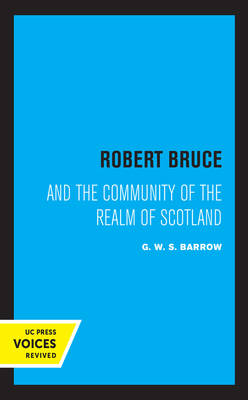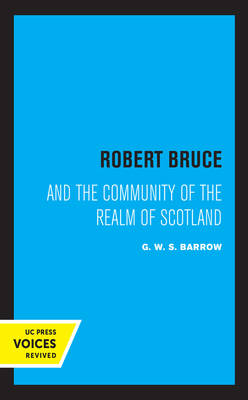
- Retrait gratuit dans votre magasin Club
- 7.000.000 titres dans notre catalogue
- Payer en toute sécurité
- Toujours un magasin près de chez vous
- Retrait gratuit dans votre magasin Club
- 7.000.0000 titres dans notre catalogue
- Payer en toute sécurité
- Toujours un magasin près de chez vous
161,45 €
+ 322 points
Format
Description
G.W.S. Barrow's Robert Bruce and the Community of the Realm of Scotland has long been recognized as a landmark study of both a pivotal monarch and the constitutional idea that underpinned Scotland's survival as a polity in the late thirteenth and early fourteenth centuries. Rather than presenting Bruce as a solitary hero, Barrow situates him within the matrix of feudal society, factional rivalries, and legal culture that shaped his reign. He argues that Bruce's achievement cannot be explained solely by his courage or political skill; it was rooted in his ability to embody and channel the principle of the *communitas regni Scotie*--the "community of the realm"--a constitutional ideal that gave coherence to Scottish resistance during two decades of crisis. Through close reading of charters, governmental records, and chronicles, Barrow traces how this concept operated in practice, especially in moments of guardianship, vacancy, and national emergency, culminating in the Declaration of Arbroath (1320) as a practical analogue to contemporary continental theories of sovereignty. The book is therefore both a political biography and a constitutional history, showing how Bruce's ambitions intersected with the collective will of the realm. Barrow analyzes Bruce's shifting allegiances--first a supporter of Edward I, then a leader of resistance, and finally king crowned in the wake of John Comyn's killing--as embedded in the broader struggle for Scotland's independence. He emphasizes the durability of the Scottish polity: its capacity to sustain corporate action without a monarch, its educated clergy's continental connections, and its leaders' use of legal and feudal language to articulate sovereignty. By linking Bruce's career to the evolving idea of a national community, Barrow illuminates how a small kingdom preserved its integrity against a more powerful neighbor. The result is an indispensable work for historians of medieval Scotland, constitutional thought, and the comparative study of medieval state formation. This title is part of UC Press's Voices Revived program, which commemorates University of California Press's mission to seek out and cultivate the brightest minds and give them voice, reach, and impact. Drawing on a backlist dating to 1893, Voices Revived makes high-quality, peer-reviewed scholarship accessible once again using print-on-demand technology. This title was originally published in 1965.
Spécifications
Parties prenantes
- Auteur(s) :
- Editeur:
Contenu
- Nombre de pages :
- 531
- Langue:
- Anglais
Caractéristiques
- EAN:
- 9780520361973
- Date de parution :
- 08-01-21
- Format:
- Livre relié
- Format numérique:
- Genaaid
- Dimensions :
- 152 mm x 229 mm
- Poids :
- 911 g

Les avis
Nous publions uniquement les avis qui respectent les conditions requises. Consultez nos conditions pour les avis.






